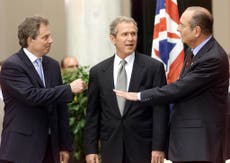Sir John Chilcot did his job, but after Iraq our whole system of government needs a rethink
Campaigners on behalf of the families of fallen soldiers could have been expected to be among the sharpest critics of Chilcot. They were largely appreciative yesterday


When Sir John Chilcot began work on what became known simply as the Iraq Inquiry, there was widespread scepticism about what sort of job he would do. Part of that scepticism stemmed from public discontent with two previous inquiries. There was a feeling that both had been deliberately drawn so narrowly as to preclude any wider consideration of how the UK came to make its worst foreign policy mistake since Suez.
The Hutton Inquiry was called to investigate the death of the weapons inspector Dr David Kelly. The Independent front page the day after the report’s publication set the tone for critics who dismissed the inquiry as a whitewash. The Butler Review looked into the failings on intelligence about Iraq’s non-existent weapons of mass destruction, but its findings were reported to have been watered down at the request of unnamed officials. “Sofa government” was among the harshest of Lord Butler’s condemnations.
Nor was Sir John’s status as a retired senior civil servant seen as any guarantee of a convincing result. Lord Butler was accused of giving his former colleagues an easy ride. Lord Hutton was a retired appeal court judge – one of the professions commonly rated as among the most trusted in the country – yet he, too, was subsequently seen as too close to power. Would Sir John Chilcot be sufficiently detached?
His inquiry was different from the start by the much wider brief he was given by then-Prime Minister Gordon Brown and by his own very public insistence that it would not be a “whitewash”. Many of the hearings, though by no means all, were held in public, with Tony Blair’s promised grilling by Sir John and his colleagues being prime box office.
This inquiry was also, in a sense, the last chance for a forensic examination of what happened in 2002-03. By 2009, when the inquiry opened, memories were already fading. Yet the hunger for answers was as great as it had ever been. The furious protests outside the Queen Elizabeth II conference centre in London as Sir John presented his report showed that the hunger has hardly diminished.
In the event, Sir John largely disproved those who feared another wasted effort. Campaigners on behalf of the families of fallen soldiers could have been expected to be among the sharpest critics. They were largely appreciative yesterday. Both in his presentation, and in as much of the report I have so far managed to read, the former civil servant pulled no punches.
There is room for misgivings. One of the merits of the inquiry – the combination of breadth and depth – makes for 12 volumes, plus a 145-page “summary” – that make it more of an archive than a report. Does an inquiry into one aspect of UK foreign policy, however catastrophic, really require so much published detail? Is there a wood and trees issue here? Future inquiries, whatever the subject, risk losing their purpose if the conclusion is too voluminous.
The seven years from the start of the inquiry to publication is unconscionable. In that time very many of those with direct responsibility for the misjudgements and sheer incompetence of the Iraq intervention – those in particular posts in the military, in intelligence, in politics, and Tony Blair – have not only left office, but moved into comfortable and well-paid positions in business, academia and consultancy. They have not had to pay – in any shape or form – for their culpability. This is one reason, I suspect, why public indignation still runs high.
Not all the delay, however, can be laid at Sir John’s door. Some of it reflected the process of “Maxwellisation” – the requirement that those subject to criticism be given a chance to respond. In this day and age, that means not just personal responses, but legal representations. There is a case, in future, for limiting this right in the interests of making inquiries manageable. If there are representations to be made, they can be made after publication.
Another reason, however, is one for which not just future historians, but today’s journalists, will be in Sir John’s debt. He argued for maximum transparency, demanding that documents seen by the inquiry should also be made public. It would appear that the objections came chiefly from civil servants, who argued that ministers and diplomats needed confidentiality in order to operate effectively.
Sir John’s determination has forced many more documents into the open that were offered, in particular correspondence between Tony Blair and George W Bush. Given the controversy surrounding preparations for the Iraq War, it was essential that these documents became public. Sir John was right to stand his ground.
The very greatest achievement of the Chilcot inquiry, however – and something that may come to be seen as a historic departure – is the way it has probed so many aspects of how this country is run, and told us how sadly they are wanting. We are so used to hearing that the UK has a “Rolls Royce” civil service, that its diplomatic corps is second to none (well, let the French take an occasional bow), that its intelligence services are right up there with the Americans and that the UK is the very model of accountability and democracy that it may come as a shock to learn how much of our government process is flawed.
True, this may seem less shocking today than it would have done before the post-referendum meltdown. But Tony Blair, for all his misplaced convictions and loyalties, is not all that was wrong. The whole system of government and politics needs an urgent overhaul, with more transparency, better record keeping, less departmental defensiveness, less received truth, more challenge to the consensus, and the channels to produce more informed decisions.
I sympathise with those calling for Tony Blair’s head, but we need to recognise that the Iraq catastrophe reflects a bigger failure of government and politics that also helps to explain the mess we are in today.


Join our commenting forum
Join thought-provoking conversations, follow other Independent readers and see their replies